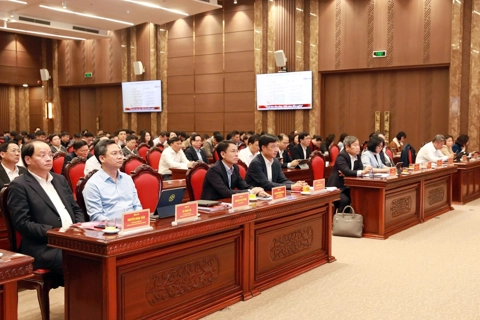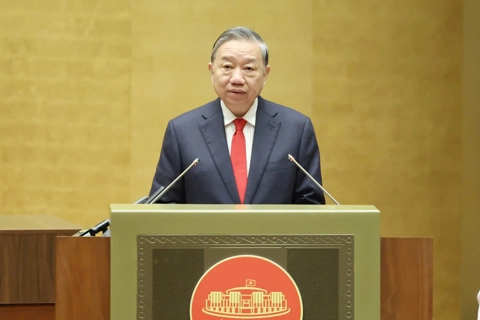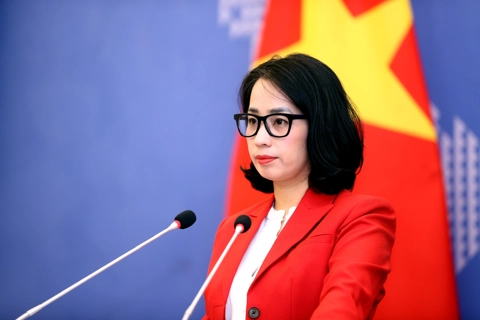Vietnam SOEs urged to lead in digital transformation
The state companies are tasked with improving their operations, boosting domestic consumption, and diversifying markets amid a volatile global economy.
THE HANOI TIMES — Vietnamese state-owned enterprises (SOEs) remain the economy’s backbone, driving economic growth with their pioneering role in key sectors while focusing on digital transformation to become more involved in the global value chain, said Prime Minister Pham Minh Chinh.
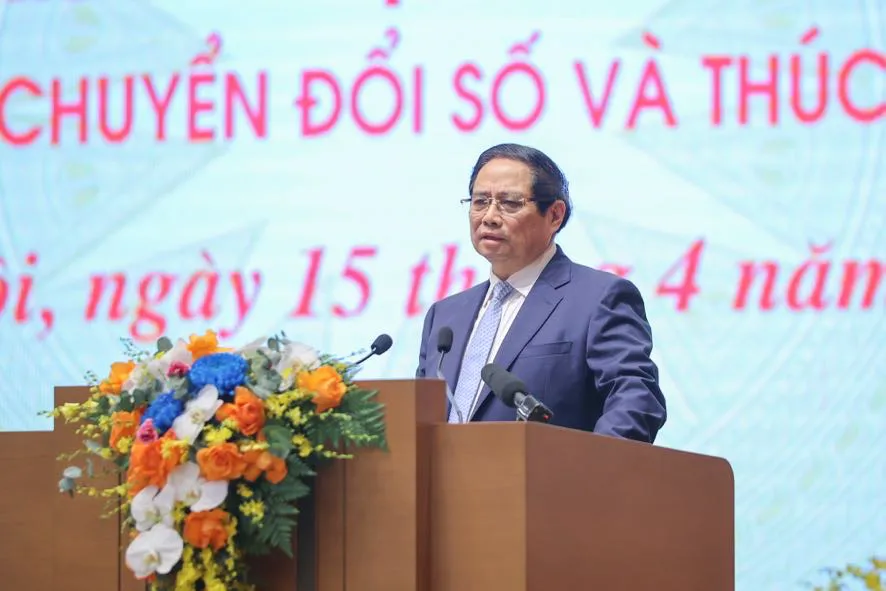
Prime Minister Pham Minh Chinh at the government meeting with leading state-owned enterprises. Photos: Nhat Bac/VGP
Chinh was speaking at a governmental meeting with chairmen and general directors of 68 leading SOEs operating in the economy’s vital areas in Hanoi on April 15, the second of its kind in a short time, to boost the internal strengths of the export-driven economy.
The conference aimed to align strategies amid global trade tensions, surpass challenges, achieve 8% growth, control inflation, stabilize the economy, and enhance livelihoods.
Key firms in digital transformation
Vietnam Posts and Telecommunications Group (VNPT), Vietnam’s top telecommunications and IT provider, is at the forefront of digital transformation, according to the firm’s General Director Huynh Quang Liem.
Over the past seven years, VNPT has pursued a strategic digital overhaul in three phases: In 2020, it digitized operations, sales, and customer support, adopting e-contracts and e-invoices and doubling productivity. In 2022, the firm built a 20-petabyte data system that processes 20 terabytes daily, enabling data-driven governance. By mid-2025, VNPT aims to integrate AI and equip staff with virtual assistants to enhance customer service and efficiency.
VNPT also drives Vietnam’s national digitalization, delivering solutions like population and land databases and AI applications for government agencies. The company seeks deeper collaboration with the government and businesses to boost productivity and growth.
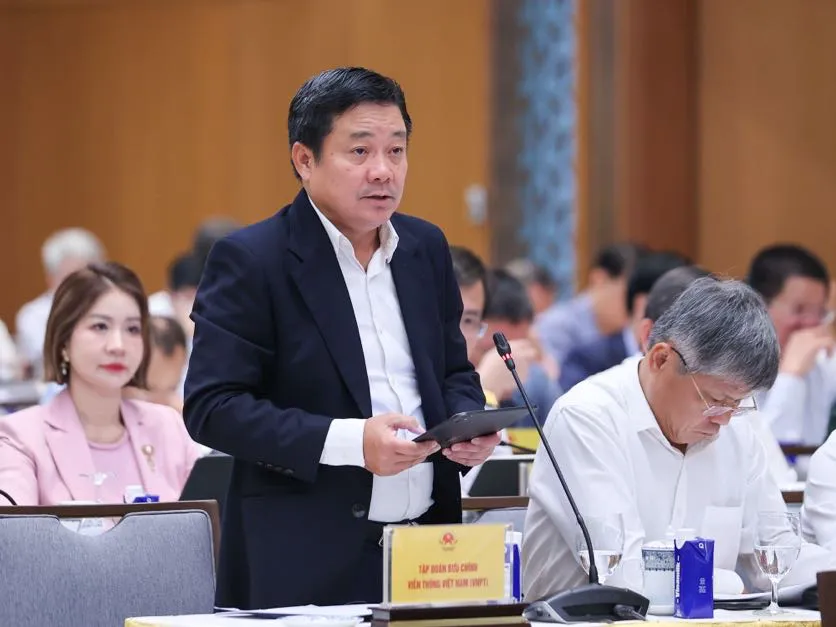
VNPT's General Director Huynh Quang Liem speaks at the meeting on April 15.
In driving innovation, Viettel focuses on three key areas: building a smart digital government, a digital society, and a digital economy. Over the years, the firm has been actively working with agencies and localities in advancing digital transformation, Viettel’s Chairman Tao Duc Thang said at the meeting.
"We aim for double-digit growth with a focus on digital transformation through six areas: institutions, data, infrastructure, digital platforms, cybersecurity, and human awareness," said Thang.
Meanwhile, Luu Trung Thai, Chairman of MB Bank, emphasized adopting a tech-company mindset for digital transformation. MB has invested $100 million annually in technology for seven years, adding roughly seven million new customers yearly, leading in transactions and growth.
By integrating tech firm systems, MB tripled its digital revenue. The bank seeks shareholder support for further tech and staffing investments. Sharing experience at the meeting, Thai proposed prioritizing digital transformation projects for state-owned enterprises (SOEs). In addition, the government allows SOEs to adopt salary structures similar to private enterprises, enabling them to allocate revenue and profits toward digital transformation initiatives.
SOEs like VNPT, MobiFone, and Viettel led digital transformation, building digital infrastructure, developing digital products, and playing a key role in digital society and high-tech defense. Meanwhile, large banks like Vietcombank and Agribank advanced digital banking.
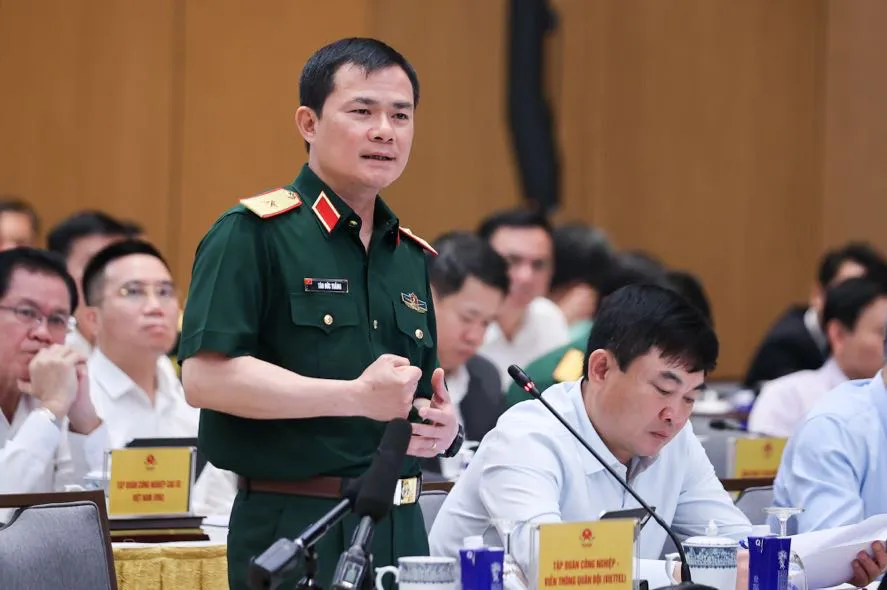
Viettel's Chairman Tao Duc Thang speaks at the meeting.
However, SOEs face shortcomings in terms of efficiency, innovation, core technology, and governance. The Ministry of Finance called for improving digital transformation policies, promoting new technologies (AI, renewables), restructuring industries, and boosting productivity and competitiveness.
They are urged to localize core technologies (Cloud, AI, BigData) and collaborate with tech firms in addition to accessing technology investment funds to test new models, issuing flexible salary and bonus mechanisms, ensuring data security and safety, and pouring money into new technologies (5G, AI) and resilient infrastructure.
The Ministry of Finance will draft decrees on state capital management, and the Ministry of Science and Technology will allocate 15% of the budget to strategic tech research.
To speed up digital transformation, the enterprises agreed that the Resolution 57 provides mechanisms, funding, and strategies for high-tech development, with State support. They urged the government to quickly implement Resolution 71/NQ-CP tasks for science, technology, innovation, and digital transformation.
Meanwhile, Deputy Minister of Science and Technology Pham Duc Long said that although state-owned enterprises (SOEs) have made progress in digital transformation, many face a number of issues that need significant changes.
He laid out five solutions, including strong leadership to drive transformation, robust data systems for AI adoption, partnerships with tech firms for continuous improvements, innovative business models for 10%+ growth, and alignment with the government’s 2024-2030 digitalization plan.
He said the ministry will assess SOE digital progress by late 2025.
Committed to supporting SOEs, the Ministry of Science and Technology will advance policies and innovation ecosystems. With leaders like VNPT and Viettel, Vietnam’s SOEs aim to shape a digitally empowered future.
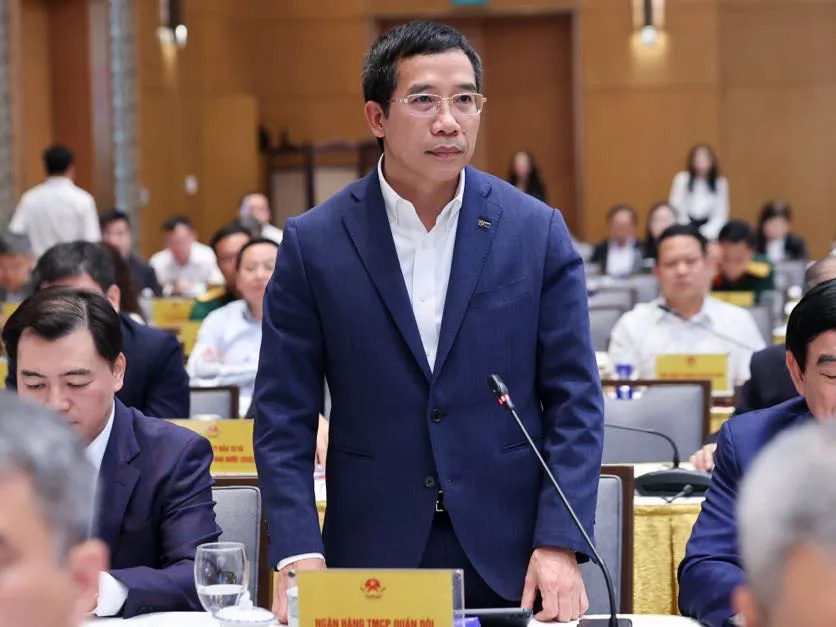
Luu Trung Thai, Chairman of MB Bank, shares his view at the meeting.
Collective efforts for economic growth
With Vietnam’s economy modest in size, highly open, and vulnerable to external shocks amid global economic volatility, Prime Minister Chinh asked SOE executives to analyze the situation, identify emerging challenges, and propose effective solutions.
Chinh said that Vietnam’s economy is facing challenges, though less severe than those during the Covid-19 pandemic, such as global conflicts, supply chain disruptions, and natural disasters. The nation has largely surmounted these obstacles due to the resilience of state-owned enterprises and the strength of national unity and solidarity.
For long-term operations, he urged SOEs to prioritize science, technology, and digital transformation as well as improve products, focus on domestic consumption, and diversify markets, including the Middle East, Central Asia, Latin America, and Africa, while strengthening traditional markets.
At the meeting, the executives agreed that businesses must streamline operations, digitize records, and build databases to support AI and digital transformation; ensure secure and efficient digitalization while strengthening cybersecurity; and train a skilled digital workforce to excel in AI. He said these efforts must be integrated with the national digital transformation, including the “Digital Literacy for All” initiative.
To boost growth, businesses should revitalize the three core drivers: investment, exports, and consumption, while cultivating new sources. At the same time, they need to expand investment and lower the incremental capital-output ratio (ICOR).
To support the SOE operations, Prime Minister Chinh asked ministries and agencies to remove institutional bottlenecks, particularly in the management of state capital in enterprises, increase decentralization, eliminate cumbersome administrative procedures, and cut procedures, costs, and compliance time by at least 30% while developing strategic infrastructure and training high-quality personnel.
The relevant authorities need to stabilize exchange rates, lower interest rates, offer preferential credit, restructure debts, accelerate public investment disbursement, provide tax exemptions or reductions, and expedite VAT refunds.
The Ministry of Science and Technology must reduce administrative procedures, while the Ministries of Foreign Affairs and Industry and Trade must promote international integration, reduce export taxes on cement clinker, and reuse coal mining waste.
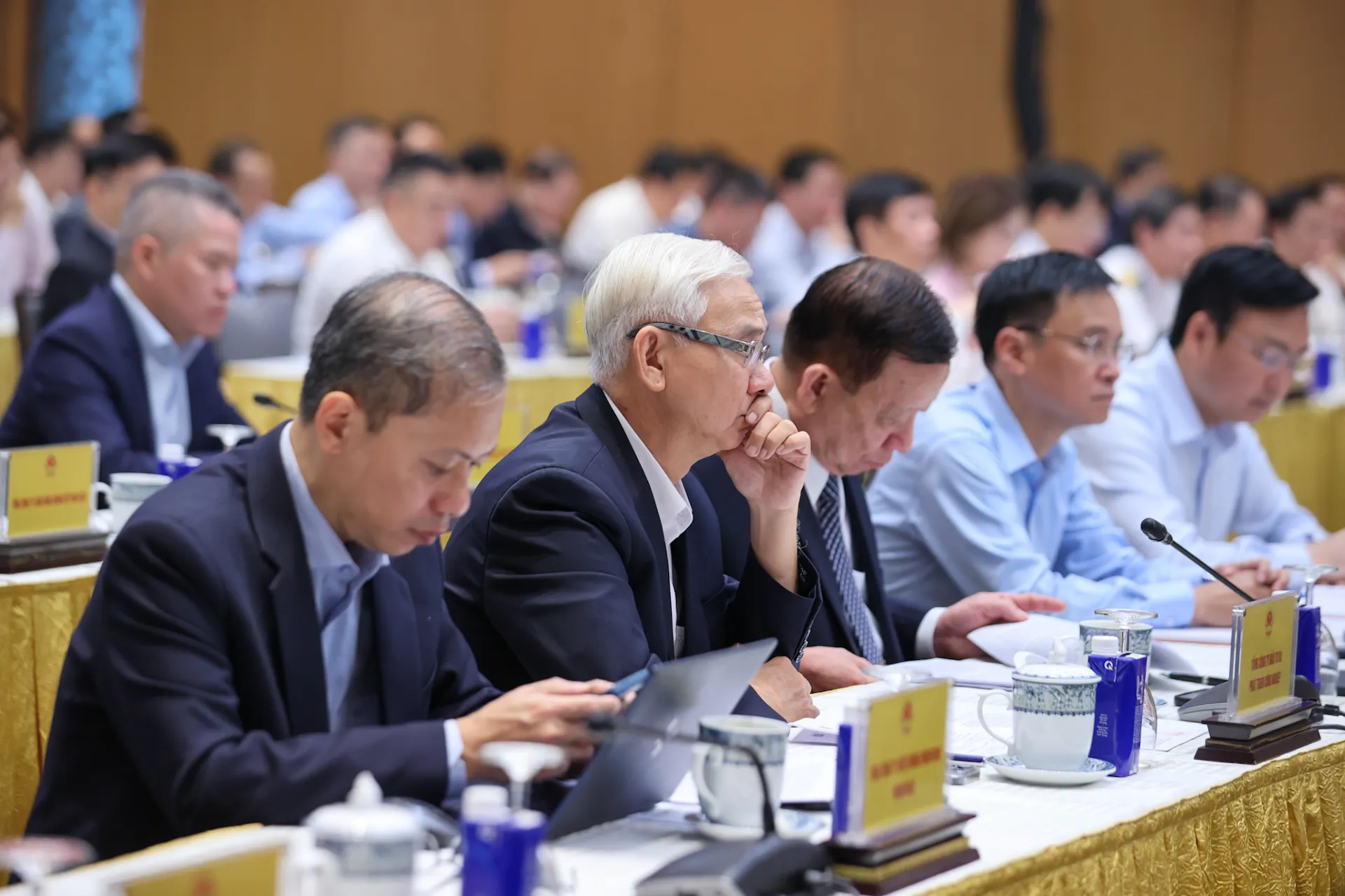
Representatives of state-owned enterprises attend the meeting on the role of SOEs.
Role of SOEs
In 2024, the group of 671 state-owned enterprises (SOEs) recorded total assets of VND5,600 trillion (US$217 billion), up 45% year-on-year; equity of VND3,000 trillion ($116 billion), up 61%; revenue of VND3,300 trillion ($128 billion), rising 24%; pre-tax profit of VND227.5 trillion ($8.8 billion), up 8%, and VND400 trillion ($15.5 billion) to the state budget, up 9%.
Vietnam targets 8% GDP growth in 2025 and double-digit growth thereafter, with efforts required to leverage internal strengths regardless of youthful workforce, strategic location, resources, culture, and external opportunities.
In this regard, SOEs need to grow stronger and lead three strategic breakthroughs, namely technology, innovation, and digitalization, while tightening cooperation with the private sector.


